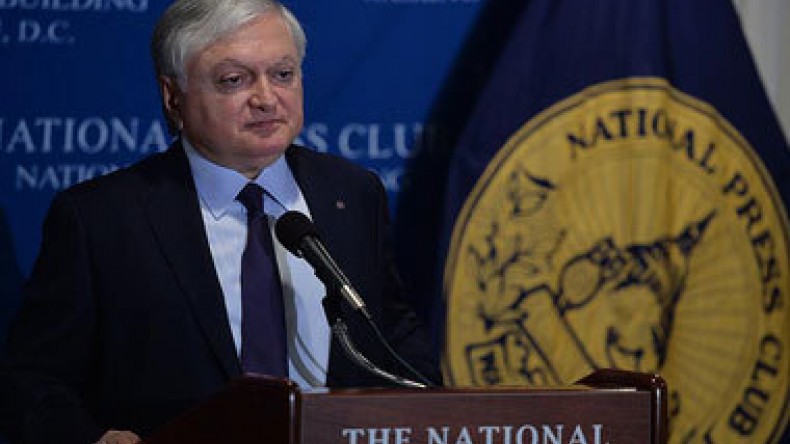
Armenian FM criticizes Turkey for Genocide denial – The New York Times
By Rick Gladstone, The New York Times
Armenia’s foreign minister criticized Turkey on Thursday over its angry responses to what he called the growing and “irreversible” trend of global acknowledgments that the killings of ethnic Armenians by Ottoman Turks 100 years ago was a genocide.
The minister, Edward Nalbandian, also expressed hope that President Obama, who had described those killings as a genocide before he was elected president, would use that terminology while still in office, which he has not yet done. “Of course if the president uses the G-word it would be a strong and important message,” Mr. Nalbandian said.
He spoke by telephone from Washington, where an official delegation led by Armenia’s president, Serzh Sargsyan, has been visiting to participate in centennial commemorations to remember victims of the genocide.
An estimated 1.5 million Armenians were killed and their property destroyed or confiscated during the period of 1915 to 1923 when the Ottoman Empire collapsed, and many survivors and their descendants scattered into a diaspora that has placed Armenian enclaves in more than 100 countries. Some of the biggest Armenian communities are in the United States.
Turkey’s government has expressed condolences to Armenians but has denied that the killings constituted a genocide, arguing that many Ottoman Turks also were killed in that era of war and upheaval. It has responded angrily in recent weeks to declarations by Pope Francis, the European Parliament and others that Turkey should acknowledge the killings as a genocide. The word was invented in the 1940s by a Polish-Jewish jurist, Raphael Lemkin, who said he created it in part because of the Armenian killings.
The latest target of Turkey’s anger was Luxembourg, which on Wednesday adopted a resolution recognizing and condemning the Armenian genocide, becoming at least the 22nd country to do so. Turkey recalled its ambassador to Luxembourg in response, denouncing the resolution as a distortion of history.
Mr. Nalbandian, who has been deeply involved in the centennial events in Armenia and abroad, suggested that it was unlikely that a normalization of relations with Turkey would happen soon, partly because of the unresolved genocide legacy issue. The Turkish-Armenian border is closed, and there is virtually no trade between the countries.
“We are where we are,” he said. “Turkey is just continuing its policy of denial. They are criticizing, but the process of recognizing genocide is irreversible.”
Mr. Nalbandian said he was encouraged that an increasing number of Turks appeared to be questioning their government’s official policy of genocide denial. He also said a Turkey-Armenia reconciliation was necessary.
“We have no other alternative,” he said. “We have to live together, not with a policy of denials, but with joint efforts to turn the dark pages.”
Noubar Afeyan, a prominent American venture capitalist of Armenian descent who is chairman of the national committee that organized the centennial events in Washington, said many members of the post-genocide generation had moved beyond grief, embracing the tenacity of the Armenian diaspora, which now totals 10 million.
“As an Armenian who was born in Lebanon, grew up in Canada and lived in the United States for 35 years, I believe it’s the natural result that Armenians are maturing in relation to this tragedy,” Mr. Afeyan said in a telephone interview. “It’s extending to be not only about crimes and victims, but survivors and their saviors.”
Newsfeed
Videos






























